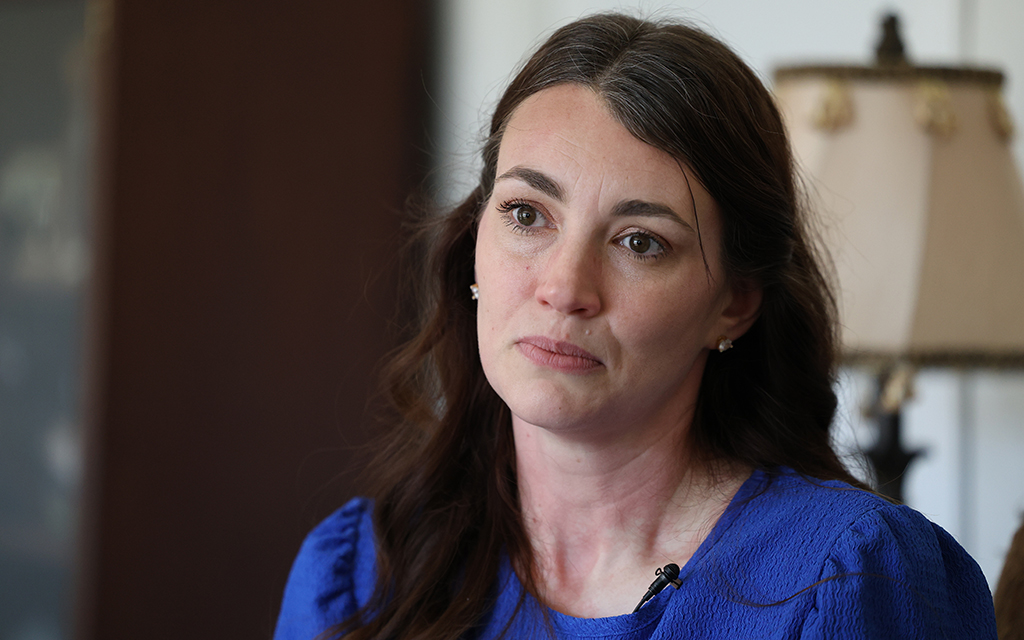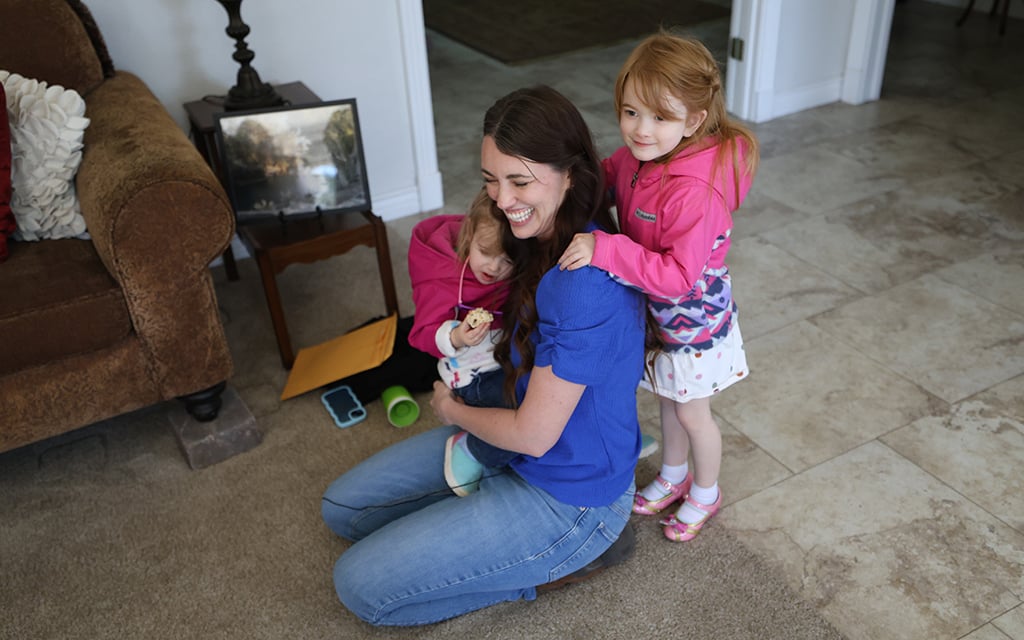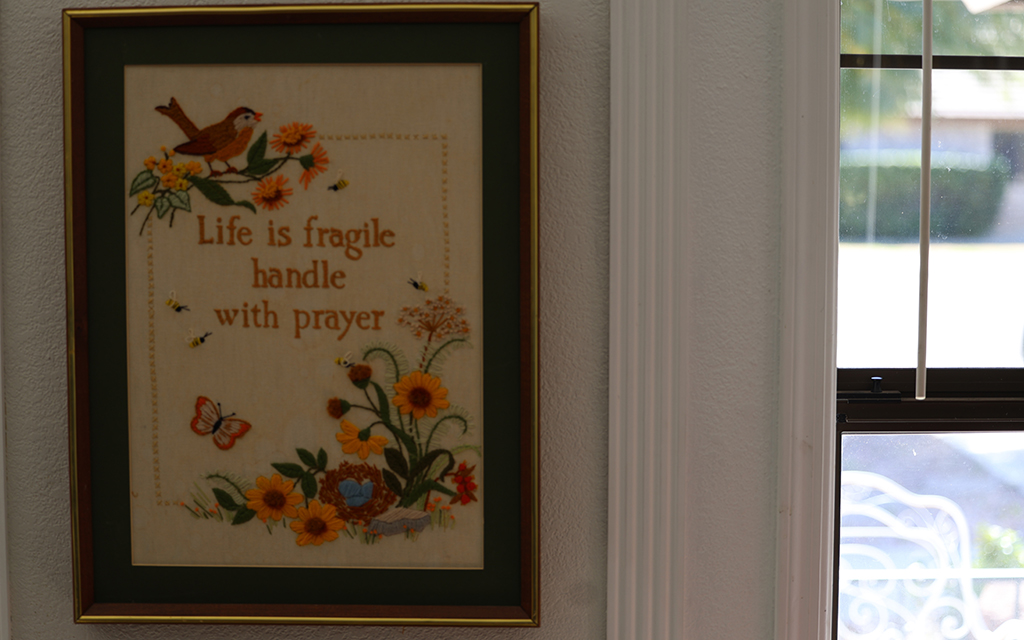PHOENIX — The Food and Drug Administration approved the first pill meant to help parents treat their postpartum depression, but it comes at the cost of $15,900 for a 14-day treatment cycle.
Mrs. Arizona International 2023 Carolyn Larsen knew she was at risk, even though she had no history of depression or mental health issues, because her sister had suffered from postpartum depression. But she always wanted to be a mom, so she made grand plans in preparation for her first child.
Despite those plans, after her daughter was born in April 2020 Larsen was hit by postpartum depression, and by May 2020, she was having suicidal thoughts.
Postpartum depression occurs after having a baby, according to the Cleveland Clinic. Its symptoms include “emotional highs and lows, frequent crying, fatigue, guilt, anxiety, and trouble caring for their baby.”
Dr. Leigh Lewis, co-chair of Postpartum Support International Arizona chapter, and a naturopathic physician certified as a women’s health specialist, said there are different stressors that cause postpartum depression. Those include, but are not limited to, relationship issues, preexisting medical conditions like anxiety, bipolar disorder and depression, and unexpected events such as the mother having health issues or a baby that has to spend time in the neonatal intensive care unit.
A study done by the electronic journal Innovations in Clinical Neuroscience said postpartum depression can also occur in fathers.
Lewis said that both birthing and nonbirthing partners can be impacted by perinatal mood and anxiety disorders, and “it’s something that happens to a number of families. And when one partner is impacted, it really increases the risk of the other partner being impacted as well.”
According to a study by Cambridge University, a family history of mental health issues such as postpartum depression can also make a person more vulnerable.
Biogen and Sage Therapeutics, the manufacturers of zuranolone, for sale as Zurzuvae, advertise that their studies show improvement within 15 days of taking the medicine and when compared to a placebo, Zurzuvae is effective as early as three days after starting treatment.
Dr. Saira Kalia, associate professor of psychiatry at the University of Arizona College of Medicine in Tucson and the director of the Arizona Perinatal Psychiatry Access Line, said that the studies also show that it can be determined within three days if the person is responding to the medicine.
“Speed makes a big difference in terms of response and everything,” Kalia said.
Lewis said it is important to know as soon as possible “that mom is feeling her best so she can care for herself and her baby.”
Zurzuvae is the first pill, and the second medication overall, approved by the FDA to treat postpartum depression according to a press release from the agency.
The first FDA-approved postpartum depression medication was brexanolone, under the brand name Zulresso, which, according to the Zulresso website, can only be administered through an IV at certified health care facilities, such as a hospital or pharmacy, due to the risk of sudden loss of consciousness.
Kalia said Zurzuvae and Zulresso are essentially the same drug but Zurzuvae is much more accessible in the sense that a parent does not have to be hospitalized and away from their child.
“Hospitalization, needing to be hospitalized and the impact it has on the whole family is not a simple thing,” Kalia said.
Larsen’s story
Despite all her planning, Carolyn Larsen said she had a traumatic birth at the outset of the COVID-19 pandemic.
“I hemorrhaged and had to go to the hospital, I couldn’t have my husband with me, I couldn’t have my new baby with me and I was there for several days. It was very isolating,” Larsen said.
After her experience at the hospital, Larsen had a hard time bonding with her baby. “Even though it wasn’t her (the baby’s) fault that I was going through this postpartum hemorrhaging, I was like kind of mad,” Larsen said. “I could’ve very easily died. It was not a good place for me mentally.”

Carolyn Larsen struggled with postpartum depression after the births of both of her children. (Photo by Jack Orleans/Cronkite News)
Larsen said it was a very dark time for her.
During this time, Larsen felt like her family didn’t need her.
“It felt like they could take care of themselves without me,” she said.
With her first child, Larsen said she did not use medication to treat her postpartum depression. She said she found her peace through talk therapy with a good friend, who is a counselor by trade and had a baby the year before.
Larsen said she would talk about what was going on in her life and her friend would validate her feelings and talk through her birth story.
“I had to hash out my birth story over and over for me to feel OK again. I had to go back to the birth center and leave with my husband and baby so mentally I can have that complete experience that I had wanted,” Larsen said.
Larsen said she knew since she experienced postpartum depression with her first child she could experience it again. So when she got pregnant with her second child, she worked with her psychiatric nurse practitioner and made different plans, which included simple goals such as “brush your teeth,” “get out of bed” and “go outside when the baby comes.”
When Larsen had her second child, she said the birth was less complicated “and I was like, ‘Yes! OK, I can do this!”
“And then within six weeks, those feelings of darkness came faster and stronger, even though I was prepared,” Larsen said.
Larsen said she has a picture from the day she had suicidal thoughts from her second time with postpartum depression.
“And you would never ever know because I’m usually like a pretty even-keeled, happy-go-lucky person and you would never know. I had taken my other daughter to swim lessons that day. I had been around people and I had been talking to them with a smile on my face. You never know who’s hurting,” Larsen said.
Larsen said she then reached out to her husband, sisters, best friends and her midwife to let them know what was happening and she started medication immediately.
“It took a lot of courage to be able to share those feelings with other people because those are hard feelings to say that you need help. And it’s hard to swallow your pride and ask for help,” she said.

Carolyn Larsen embraces both of her kids on Feb. 15. (Photo by Jack Orleans/Cronkite News)
Larsen said the medication helped take the edge off the suicidal ideation but it was affecting her negatively in other areas so she stopped taking it. Instead, she decided to try to find her purpose of how to be happy and bond with her children.
Finding help
“I wish I would have known that PSI existed. I did not know,” Larsen said.
Postpartum Support International (PSI) is a nonprofit organization dedicated to serving the needs of pregnant and new parents in the United States and all over the world according to its website.
The site said PSI offers assistance to people including mothers, fathers, LGBTQIA parents, military families and women of color through partner organizations such as Perinatal Mental Health Alliance for People of Color and La Alianza en Español.
Lewis said PSI has taken a huge role in increasing the number of providers of color.
When postpartum depression is treated, Lewis said it is often treated as a family rather than an individual parent because postpartum depression is seen as a family situation.
“The number one, first line, gold standard treatment for any perinatal mood and anxiety disorder in either partner is therapy,” Lewis said.
Lewis said people can find mental health professionals by typing in their ZIP code into the PSI website to find professionals who provide services through a wide range of methods such as in-person and telemedicine.
“The other thing that is very helpful is support,” Lewis said.
Lewis said PSI includes a variety of support groups for different types of families, including those coping with maternal suicide or stillbirth.
Larsen, who has since been crowned Mrs. Arizona International 2023, said she wanted to create an easy way to help people.
“Because sometimes when people say, ‘Oh, how can I help you?’ It takes me at least three times before I say, ‘oh I actually do need some help.’ And sometimes when you say, ‘Let me know how I can help you,’ that’s not very helpful, right? You need an action plan,” Larsen said.
She said she created the 50 Ways to Adopt a Mom, a handout meant to assist parents and their family members through the postpartum period.
“I wanted to create a handout that you can just refer back to where it could be the mom can use it or the person that’s trying to help,” Larsen said.

A window in her mother’s house on Feb. 15 highlights the commitment of Carolyn Larsen’s family to positivity. (Photo by Jack Orleans/Cronkite News)
Some of the ways to support a parent listed on the handout include doing the dishes, video chatting, helping the parents go on a date night, and sending or bringing flowers.
Oftentimes, Lewis said, it is important to consider combining therapy with psychiatric medications as well. But when a medication is new and in high demand, Lewis said, it is difficult to get it to everyone.
“You can imagine that most people are not going to be able to afford that (Zurzuvae),” Lewis said.
In a statement to Cronkite News, Biogen and Sage Therapeutics said the companies recognized that women of color are reported to be disproportionately impacted by postpartum depression. The companies said their goal is “to help enable broad and equitable access for women with PPD who are prescribed ZURZUVAE.”
Through the Zurzuvae For You program, Sage and Biogen said financial assistance may be available to help pay for the medication.
Swallowing pride
Even if people suffering from postpartum depression do not have a support system to help through this period in their lives, Larsen said, “there is help.”
“There’s always somebody,” she said.
PSI has resources that allow people to meet up online, she said, and find interest groups, such as rock-climbing groups, that can help people suffering from postpartum depression.
“People most often they want to help. They just don’t know how. So if you can swallow your pride, ask for help and be specific about what you need,” Larsen said.



